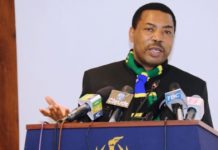AfricaPress-Tanzania: PANAFRICAN Energy Tanzania Limited (PAET) has paid additional profits tax (APT) of 27.5bn/- (11.94 million US dollars) to the government, becoming the first ever oil and gas company in the country to pay this special contractual tax.
The PAET’s Managing Director, Andy Hanna, said tax is paid entirely from what would otherwise be the Company’s profit.
It is paid above and beyond the regular revenue share, taxes, duties and levies that are payable for the year.
“After producing gas for more than 15-years, this important clause has finally been triggered. It might be an unusual thing to say, but we are delighted to be able to make this major payment,” he said.
Up to the end of 2019, the company has already paid to the government 555bn/-in taxes, duties and levies, plus a further 160bn/-under the normal profit sharing mechanisms.
“The additional profits tax we have now paid further demonstrates the value of this project to the people of Tanzania. That value is not just about revenues but is also about the power, industrialisation, employment, services, safety and savings it has delivered.”
“Our small Company, made up almost entirely of Tanzanians, proud of its achievements, and we expect there to be more payments like this in the years ahead,” he added.
The Company, which is the leading gas producer in Tanzania, produces gas from the Songo Songo Gas Field and transports it to Dar es Salaam where it is used for electricity generation.
It is also used to sustain more than 40 major industries in the city, as well as to supply compressed Natural Gas (CNG) to affordably fuel an increasing number of private and commercial vehicles, hotels and industries.
The Songo Songo Production Sharing Agreement (the PSA) was signed in 2001 and is the major contract between the Company and the government which, alongside various other contracts, determines how gas production operations are conducted and more importantly, how revenues from operations are shared.
The PSA places several obligations upon the Company, which have all been met.
However, achieving this while increasing and sustaining gas production has required considerable financial investment and acceptance of risk on its part.
The Company has drilled several new gas wells and has maintained existing ones that were drilled as long ago as 1974.
Alongside this, they have increased the production capacity of the Songas gas plant to ensure more gas could be supplied to TANESCO for power generation, and have developed more than 50 kilometres of downstream supply infrastructure to power up more than 40 industries.
The Company’s investments have enabled local manufacturers to reduce their production costs of products, created many employment opportunities and helped build an oil and gas service industry here in the country that will form the basis for future development.
Until recently, such investments have constrained the Company’s profits since production started in 2004.
Under the PSA, once the company has recovered its operating costs and paid all taxes, duties and levies in accordance with the laws of the land, the remaining profits are shared with the government in proportions agreed within the contract.
This is normal and found in the vast majority of PSAs around the world. However, unlike many other gas contracts, the Songo Songo PSA restricts the level of profit the company can make.
When the costs of the company’s operations have been recovered and the company’s returns increase above a certain threshold, a special clause within the agreement is triggered, and a windfall tax, the additional profit tax becomes payable to the government.







